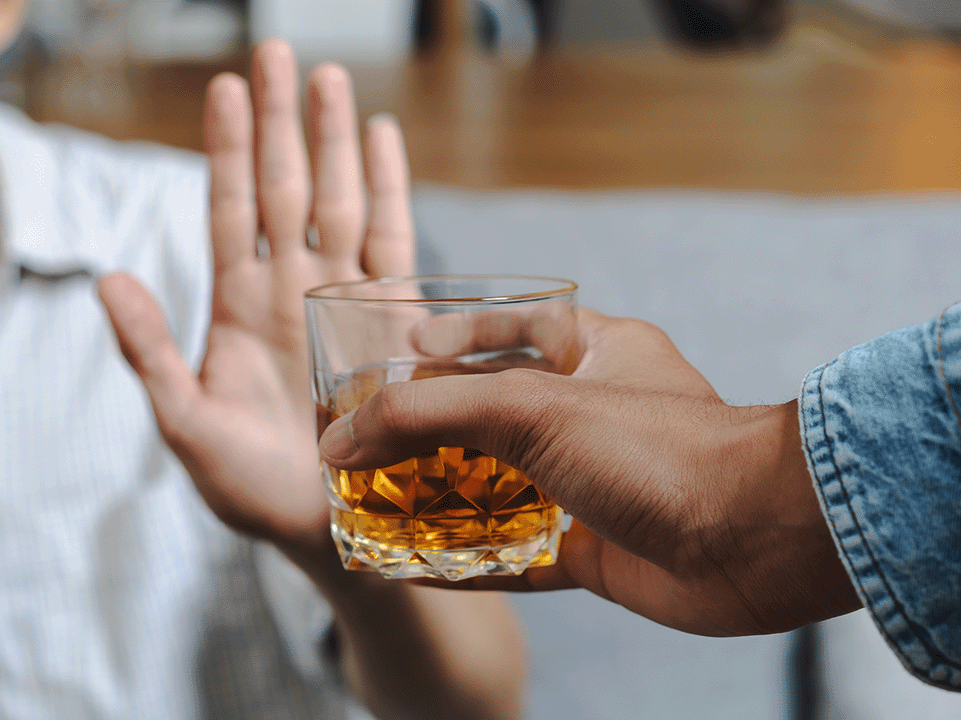The more you drink in one sitting, the longer you will need to get sober. Even when you feel sober, alcohol may still appear in a drug test. Here’s how long you’ll test positive via common testing methods:
Blood
Up to 12 hours
Breath
Up to 24 hours
Breast milk
Up to 3 hours
Hair
Up to 90 days
Saliva
Up to 48 hours
Urine
Up to 5 days
There’s nothing you can do to sober up faster. Your best bet: Don’t drink too much alcohol or stop drinking altogether.
How Is Alcohol Metabolized?
Approximately 20% of the alcohol that an individual consumes quickly enters their bloodstream by being absorbed through the stomach.
Each sip of alcohol moves from your mouth to your stomach and out into the bloodstream. From there, it’s transformed into metabolites and then removed from your body.
A typical alcohol metabolization pathway looks like this:
Enzymes are released
Alcohol dehydrogenase (ADH) and aldehyde dehydrogenase (ALDH) enter the bloodstream and break apart molecules of alcohol.
Transformation begins
Alcohol becomes acetaldehyde. This substance is toxic, and it’s partially responsible for alcohol’s link to cancer risks.
Transformation ends
Acetaldehyde becomes acetate, then water and carbon dioxide.
The elimination process begins
Alcohol is removed through your breath and urine.
Your liver works hard to remove alcohol from your body. This organ makes the enzymes that start the digestive process. But your liver works slowly. It can reduce your blood alcohol content (BAC) by about 0.015 per hour.
Your alcohol metabolization rate is influenced by your sex, race, age, and weight. Your organ health matters too. But in general, metabolizing alcohol is a slow process.


What Happens When You Drink Alcohol Every Day?
What Is Blood Alcohol Content?
Blood alcohol content (sometimes called blood alcohol concentration) is a measurement of the alcohol in your bloodstream. It’s typically represented as a percentage. A BAC of 0.08% means that 0.08% of your blood contains alcohol.
Your BAC could be measured for one of the following reasons:
Legality
If officials suspect you were driving under the influence, or they think you’ve been drinking when you’re too young to do so legally, they might check your BAC.
Employment
Some organizations test blood samples before sending out job offers. Others use testing to see if employees have been working while impaired.
Health
Doctors might assess your BAC if you enter the hospital with symptoms that suggest alcohol poisoning. If you’re in a treatment program for alcohol use disorder, doctors might use tests to ensure you’re complying with treatment.
BAC is a respected and frequently used assessment of a person’s alcohol use, but it’s very easy to influence.
For example, drinking on an empty stomach allows the alcohol to enter your bloodstream very quickly. You’ll have a much higher BAC with this method–in a shorter time frame—than you would if you drank alcohol with a meal. Absorption will be slowed if you eat a high-carbohydrate snack (like pasta).
Can You Sober Up Quicker?
Once alcohol enters your body, there’s no way to make your body metabolize it more quickly. Your liver needs time, and you can’t push it.
If you’re worried about passing an alcohol screening test after a big event, follow a few tips from food service workers:
Count
Keep track of how many drinks you’ve had in one sitting. Keep a mental note so you don’t drink too much.
Observe
Are you feeling tipsy? Stop drinking now. If you continue drinking, you’ll end up drunk.
Sip
Ask for a glass of water or another nonalcoholic drink to stay hydrated. Alternating alcoholic beverages with water can slow intoxication.
Eat
Food helps to slow alcohol absorption, and a snack keeps your mouth busy too. Food won’t help you sober up once you’re already drunk.
Skip
Don’t order a new drink every time your server checks on you. It’s better to nurse one drink over a longer period of time.
If you’ve tried to limit how much you drink in one sitting and you can’t, don’t drink alcohol at all. Stick with water, juice, tea, or other tasty nonalcoholic beverages.
What’s a Standard Drink?
When considering how long alcohol stays in your system, most people talk about how many drinks organs can process in a specified time frame. However, what a standard drink actually entails might surprise you.
According to the National Institute on Alcohol Abuse and Alcoholism, a standard drink in the United States contains about 14 grams of pure alcohol. By that reasoning, the following beverages constitute one standard drink:
12 ounces
Of regular beer
10 ounces
Of malt liquor or hard seltzer
5 ounces
Of table wine
1.5 ounces
Of brandy or cognac
1.5 ounces
Of gin, tequila, or other distilled spirits
If you’re drinking at home, you could read the labels and measure your drinks very carefully to ensure you don’t consume more than you should. In a bar, it’s much harder to ensure that the drinks you accept aren’t stronger than you expected.
Alcohol Testing: What You Should Know
A typical alcohol test happens “in the field.” You’ve been pulled over for erratic driving, and a police officer wants to determine if alcohol is to blame. These breath-based tests can detect your drinks for up to a day.
Your employer might use blood, urine, or other tests to determine if you’ve been drinking recently. Timeframes on these tests are extended, and some forms that look for alcohol metabolites can spot your drinks for days.
Plenty of get-sober-quick myths exist, and none of them work. You can’t get sober quickly by doing any of these:
Drinking coffee
Eating a big meal
Taking a cold shower
Throwing up
Don’t try to cheat a test. Instead, look for ways to limit your drinking.
And if you can’t stop drinking on your own, get help from a qualified treatment program. If you want to stop drinking and aren’t able to, it’s a sign you need help.
- Alcohol Alert. (July 2007). National Institute on Alcohol Abuse and Alcoholism.
- Alcohol Metabolism. Bowling Green State University.
- Server Tip: How to Slow Alcohol Service. State Food Safety.
- DUI Alcohol Breathalyzer Tests. Nolo.
- Drinking Alcohol: Myths vs. Facts. (December 2016). University of Virginia.
- It Takes Time to Sober Up. University Health Service, University of Michigan.
- How Can I Sober Up Fast? (March 2018). SHAPE.
- Alcohol Metabolism. (November 2013). Clinical Liver Disease.
- Underage Drinking: Myths Versus Facts. (2021). Substance Abuse and Mental Health Services Administration.
- Blood Alcohol Level. (September 2022). U.S. National Library of Medicine.
- Effects of Meal Composition on Blood Alcohol Level, Psychomotor Performance, and Subjective State After Ingestion of Alcohol. (December 1988). Appetite.












